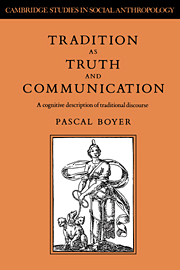Book contents
- Frontmatter
- Contents
- Preface
- Acknowledgements
- 1 Conserved world-views or salient memories?
- 2 How to think with ‘empty’ notions
- 3 Criteria of truth
- 4 Customised speech (I): truth without intentions
- 5 Customised speech (II): truth without meaning
- 6 Customised persons: initiation, competence and position
- 7 Conclusions and programme
- Notes
- Bibliography
- Index
- Cambridge Studies in Social Anthropology
2 - How to think with ‘empty’ notions
Published online by Cambridge University Press: 27 August 2009
- Frontmatter
- Contents
- Preface
- Acknowledgements
- 1 Conserved world-views or salient memories?
- 2 How to think with ‘empty’ notions
- 3 Criteria of truth
- 4 Customised speech (I): truth without intentions
- 5 Customised speech (II): truth without meaning
- 6 Customised persons: initiation, competence and position
- 7 Conclusions and programme
- Notes
- Bibliography
- Index
- Cambridge Studies in Social Anthropology
Summary
The translation or gloss of specific cultural categories is an important aspect of anthropological description. It is therefore appropriate to begin our survey of traditional interaction and its psychological conditions by some remarks on concepts and categories. Describing local categories is more often than not a difficult task, for reasons both trivial and important. Some terms designate institutions which are just absent from the anthropologist's world (e.g. ‘potlatch’) so that the gloss must comprise some description of the referent; such difficulties are easily overcome. In this chapter, however, I will focus on the thorny problems posed by some fundamental categories of traditional ritual. They seem crucial in the description of whole systems of representations and interaction; yet their interpretation in anthropological theories is extremely problematic.
The analysis of local categories is usually considered an excellent approach, at least as a starting point, in the description of social interaction. Obviously, the description of social interaction cannot but mention the categories actually used by the participants; there is simply no way to describe, e.g., the interaction of shamans and their clients without considering their notion of ‘spirits’ or ‘souls’, or some fertility rituals without a notion of ‘ancestors’, as the case may be. Not to put too fine a point on it, categories should be described because their use is part of the interaction described. People use them, argue about them, and so on.
- Type
- Chapter
- Information
- Tradition as Truth and CommunicationA Cognitive Description of Traditional Discourse, pp. 24 - 45Publisher: Cambridge University PressPrint publication year: 1990



